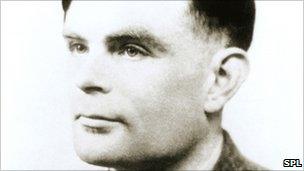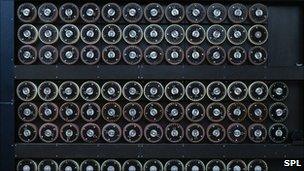Enigma codebreaker Alan Turing's papers fail to sell
- Published

Alan Turing killed himself after being prosecuted for having a sexual relationship with a man
Papers published by World War II codebreaker Alan Turing have failed to sell at auction - raising hopes they could be kept in the UK.
The Manchester University scientist, who killed himself in 1954, created a machine at Bletchley Park to crack messages in the German Enigma code.
His research papers failed to reach a reserve price at Christie's on Tuesday.
It means a campaign to raise funds to buy them for the Bletchley Park trust for public display will continue.
Turing, who has been called the "father of the computer", published only 18 papers in his short career.
The collection, which contains his first published paper, his pioneering work on artificial intelligence and the foundations of the digital computer, had a guide price of between £300,000 and £500,000.
But the BBC's Technology Correspondent Rory Cellan-Jones, who attended the auction in London, said bidding stalled at £240,000.
He said this gave campaigners - who failed to raise enough money to match the guide price - another chance to secure the papers.
"In a way it was the best result they could hope for this afternoon," he added.
Donation hope
Since it was announced that the papers were going to be sold, IT journalist Gareth Halfacree has been trying to raise the cash to buy them and donate them to Bletchley Park Trust in Milton Keynes.

Turing's Bombe machine is viewed by many as the ancestor of the modern computer
So far he has raised £85,000 having just received a $100,000 (£62,784) donation from Google.
He told the BBC there was disappointment that they could not afford to buy the collection, but added: "The fact they haven't sold and the fact we might now have a second crack of the whip is brilliant news.
"We can try and raise more money and try to get the amount we've got to bid with up, and keep them at Bletchley Park."
Mr Halfacree added that he still hoped technology giants such as Microsoft, Apple or Yahoo might also come forward with donations.
Turing, described by the BBC's correspondent as a "hero for geeks", was prosecuted for having a sexual relationship with a man and later committed suicide by biting into an apple which he had laced with cyanide.
He was found dead at his home in Wilmslow, Cheshire, where a plaque has been erected to pay tribute to him.
Last year, the then Prime Minister Gordon Brown gave Turing a posthumous apology for the "appalling" treatment he received for being gay.